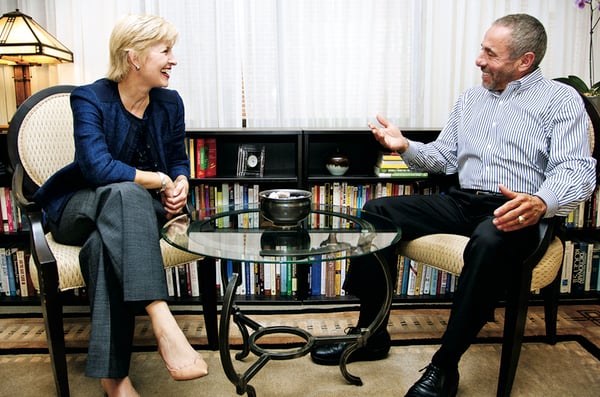Switching careers can be hard. Counselors Karen James Chopra and Jim Weinstein say about a third of their clients tell them, “I have no idea what I want to do.” Photograph by Kevin Koski
For Karen James Chopra, an unwanted promotion in her mid-thirties made her realize she needed a new profession.
“I thought, ‘You can’t pay me enough to want to do the next job,’ ” she says of her first career as a US trade negotiator. She sought the help of a career counselor to figure out what to do next and then decided to become a counselor herself.
Jim Weinstein had a similar epiphany in his early forties, when he worked as an advertising executive. He quit and eventually enrolled in a clinical-psychology program, which led to his current profession as a career coach, psychotherapist, and “life consultant.”
Today, Chopra and Weinstein help clients navigate their own career transitions. Their field is booming: The Bureau of Labor Statistics–which groups educational, career, and school counselors together–estimates that the industry will grow by 14 percent, to 314,400 workers, by 2018. People used to get career guidance within companies, says Chopra, but that kind of support is harder to find now–though perhaps more necessary because people change careers and jobs more often.
Unlike most career coaches, Chopra and Weinstein have mental-health backgrounds, which means that in addition to helping with résumé-writing and networking skills, they delve into deeper issues that can hold people back from pursuing their dream jobs. Chopra received a master’s degree in community counseling from George Washington University and is a licensed professional counselor. Weinstein has a master’s in clinical psychology from Antioch University in Los Angeles and is a licensed psychotherapist.
Chopra and Weinstein have private practices in DC. In Chopra’s K Street office, they talked about what they’ve learned about the job market, making a career change, and what makes people enjoy their work.
How do you help people who feel stuck?
Chopra: If clients stumble in here, there’s something they want. But it’s astonishing how difficult it is for them to articulate what they want. I have one client who said, “I am trying to find the job beyond my wildest dreams.” And I said, “That is the trick, because it is beyond anything you’ve even permitted yourself to dream about.” It’s scary for people. It’s much safer to just put your head down and keep doing what you’ve always done.
So how do you start that process?
Weinstein: Some people know what they want–they want interview coaching, or help with networking. If someone comes in and says, “I have no idea what I want to do”–and maybe a third of my clients present that way–I start with “Let’s talk about things you’ve enjoyed doing in the past, and not necessarily work-related. What kind of hobbies, what kind of connections with people?” You’re looking for the pieces so you can start to put the puzzle together.
Chopra: It’s building a picture out of a mosaic. They give you a nugget here, a piece there, and we think: How does this make a picture?
My first session is always about getting to know them. I want to know what’s gone on in their life up to this point: family history, medical issues, drugs and alcohol, military service, trauma. Most clients who come to me have suffered some loss in the last two years. Often it’s loss of a job, but also loss of a relationship or a severe medical diagnosis, and that loss has spurred them to come looking for something positive in their life.
Then I ask my favorite question: “Tell me the story of your career, from the earliest memory of wanting to be something when you grew up, all the way through high school and key events, how you decided on college majors, why you left jobs.” It’s amazing how much information you can extract from that.
What’s the difference between talking to you and talking with a friend or therapist?
Chopra: Unlike a friend, I have no agenda. Your friend might discourage you from joining the Peace Corps, even if it’s what you really want to do, because they don’t want to lose a friend for two years. As for therapists, they have a nondirective approach. I’m fine being directive on the little things. I’m not going to tell you what to do with your life–that’s your job–but I’ll say, “Call the person back. Write the thank-you note.” My clients want a to-do list, and I’m happy to give it to them.
You’re both mental-health professionals. What does that mean you can do that a career coach can’t?
Weinstein: When there’s a dysfunctional behavior going on, such as procrastinating, there’s a valid emotional reason why–they’re not just being lazy or sloppy. With my help, there’s a better chance we can figure out why. A therapeutic background also gives a better sense of what is going to enrich your life and what fulfillment is going to be like for that person.
Chopra: A coach is not going to spend so much time worrying about the emotional pieces. With me, you get a more holistic approach, because whatever has gotten in the way of career stuff, I promise you, has gotten in the way of other stuff, too.
Who should go to a career counselor?
Chopra: There is almost no one it is not right for at some point. Maybe when a job disappears or when you wake up and realize you’re really unhappy or you missed your true calling.
Weinstein: I am going to go even further than that. I think just about anybody can benefit from a couple of sessions, even if everything is going really well, because you’re coming to somebody with an objective experience and they’re going to look at what you’re doing and say, “Have you thought about tweaking it this way or that way?” You’re almost certain to get more out of it than what’s spent.
How much does it cost to work with you?
Chopra: Most clients work with me for 10 to 20 sessions. It costs around $150 to $175 an hour.
Weinstein: For me, it’s a little more than that, up to $250.
Do you have an ideal client?
Weinstein: Someone who is smart, successful, motivated, curious, and has a good income.
That person sounds successful already. Why would someone like that come to you?
Weinstein: Because they want something different and they don’t know what it is. They want to be successful in a different way. I have lots of people who are successful in the traditional sense–they’re president or vice president or making $500,000 a year, but there’s something missing. Sometimes that something can be found where they are. That is something I always try to do. Because it can be very difficult, when you’re at an upper level, to switch careers and not feel like you’re going into some kind of demeaning role.
Chopra: I’m looking for somebody who is interested in work that is meaningful for them and that supports the life they’re envisioning. The clients who are hardest to work with are the ones who are unhappy with everything and expect you to fix it. I’m a consultant–I can’t fix it. You have to be willing to do some work.
Are there people you can’t help?
Chopra: I get a lot of spouses and parents calling me and saying, “My husband really needs to see a career counselor.” I say, “They need to call me–you can’t schedule the appointment for them.” A lot of parents would like me to be their designated butt-kicker. I’m happy to work with that child, but the child has to want to work with me.
What kind of homework do you give your clients?
Weinstein: Put together a LinkedIn profile and a list of people you want to invite to join LinkedIn.
Chopra: Do me a list–a three-column chart–of every job you’ve ever had, including babysitting and lifeguarding. In the next two columns, write what you liked and what you disliked about the job. I don’t care if it’s about the job itself. Maybe it had the best officemate or the best coffee or you could roll out of bed at 10 am. It sounds like little things that have nothing to do with work, but if you do it across a career, I promise you, themes emerge.
Weinstein: I’ve found that sticking a toe in a world where they haven’t been before can give them a sense if they like it. Say you’re interested in being an architect–you can join a group on Meetup.com.
Chopra: You can see if it feels like your tribe. Do I like being with these people? Is this where I belong? Before we had the Internet, it was informational interviews. If you think you want to run a bed-and-breakfast, before you move to New Hampshire I would encourage you to talk to not one but multiple bed-and-breakfast owners.
There’s an association for everything, from forensic accounting to equine-assisted therapy. Or search on Amazon: A lot of e-books are very niche-marketed–you might find your perfect little book, and then the author becomes a networking contact for you.
How do you know when your work is done with a client?
Weinstein: When the client is done.
Chopra: You’d be amazed at how long clients feel they need to stay, because of the therapy piece. One got a job shortly after he started with me, and he said, “I’d like to keep coming, because start-up is hard and I would like a safe place to talk about all the anxiety that gets kicked up.” I force no one to leave.
Has the recession affected your practice?
Chopra: People ask, “Is it ridiculous to want a job I like more, given the state of the economy? There are so many people who would be grateful for any job–am I just being selfish wanting a happier one?”
They feel guilty?
Chopra: They feel guilty for wanting something that makes them happy because so many people are going without.
What about being realistic? What if someone comes to you and says, “I want to be a novelist”?
Weinstein: One of my clients came in–he was a bartender–and he wanted a six-figure job that allowed him to travel the world and gave him eight weeks of vacation. I said, “You’re being ridiculous. That’s not going to happen.” But wanting to be a novelist or writing a screenplay? Absolutely. There’s a process you need to get them involved in to increase the likelihood they will succeed, but a lot of novelists and screenwriters came out of nothing to be very successful.
Chopra: And a lot of people who want to be writers aren’t writing. If you want to be a writer, you need to be writing. That’s step one. If you tell me, “I want to be President of the United States,” okay, I can’t guarantee President, but are you involved in politics at all? Are you running for local office? This is how a political career happens.
What about giving a reality check if it’s something that’s unlikely?
Weinstein: What is a reality check? Your reality is different from my reality is different from a potential reality. I get nervous when I hear the phrase “reality check.”
Chopra: I wouldn’t have wanted to be the career counselor who suggested that Madonna couldn’t sing or that J.K. Rowling couldn’t write. That’s not my job. I don’t see it as my role to do a reality check. It is my job to ask lots of good questions about how this is going to happen: “This is what you said you want, and these are the steps you need to make it happen. You’re not doing them.” That’s the reality check. I’m never going to tell them they’re being crazy.
How do you help clients deal with failure and setbacks?
Weinstein: Generally if they’re aiming for something and not getting it, I urge them to keep trying. If it’s an area they’re really excited about, they can redouble their networking efforts. They’ve undoubtedly learned something from the process of being rejected.
Chopra: Failure and disappointment are an inevitable part of life. Can I promise you that you won’t fail? Can I promise it will always go well? No. When someone is picking a path, what I’m looking for is: Have they looked at all the things they’re going to have to go through? If you are a novelist, there’s going to be lots of rejection. Are you prepared for that? Is there enough passion? Are you prepared to self-publish or find other outlets for writing?
None of us can avoid failure. But if it’s something they really want and they’re engaged, they’re much more likely to be resilient in the face of a setback. People ask, “What’s the difference between the ones who succeed with career change and the ones who don’t?” The ones who succeed keep going. That’s the only difference.
You’ve each gone through big career changes of your own. How has that influenced your practice?
Chopra: I realized what a different life you can have if you love what you do every day. It made me a true believer that this is a worthwhile discussion. There is nothing frivolous about this. This is the stuff of life. I remember how hard and scary it was, so I have a lot of empathy for the journey that people take.
Weinstein: When I went from advertising to working for a nonprofit to becoming a life consultant, I remember some of the anxieties I had, so I try to elicit that from my clients. Having been there really helps. I also know the value of doing work you love as opposed to making money. I made a huge amount in advertising. I make a good amount now but not as much, but I’m much happier. Knowing that this possibility exists is a source of inspiration for me when I work with clients.
What have you learned about life?
Weinstein: That there are three qualities that are important to finding success and fulfillment: a positive attitude, even in the face of negative circumstances; showing up, or doing one’s part to move the ball forward on a daily basis; and the consistent building and feeding of relationships, both personal and professional.
Chopra: Clarity about what it is we want can be surprisingly hard to find. But the struggle to get clear is worth it. Because the light that clarity sheds on all of our decisions, once we have it, makes life so much easier.
This article appears in the November 2011 issue of The Washingtonian.


















